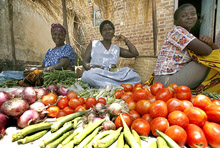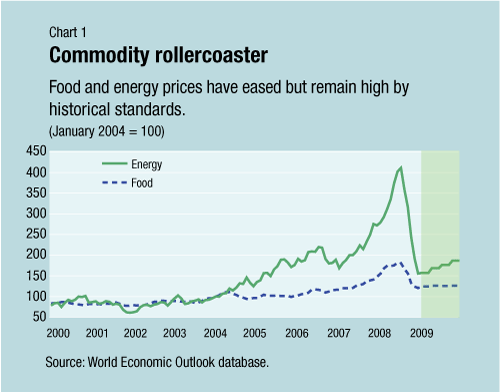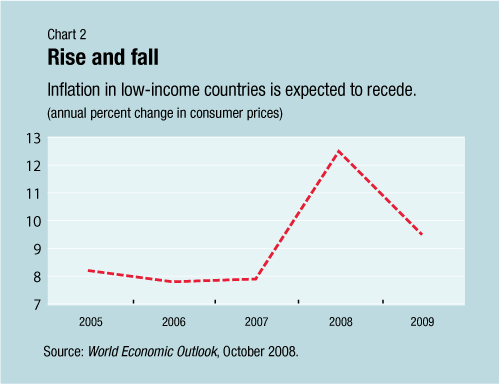
Typical street scene in Santa Ana, El Salvador. (Photo: iStock)
IMF Survey: Global Slowdown Damages Progress in Low-Income Countries
January 23, 2009
- Slowdown will compound earlier problems caused by high food, energy prices
- Local food prices remain high, hitting the poor the hardest
- IMF, World Bank, labor unions share goal of strengthening social safety nets
Low-income countries, already weakened by the high food and energy prices observed during 2008, are likely to see their economies hit hard by the effects of the financial crisis in advanced economies and the global recession, according to a panel of economists at an IMF-World Bank meeting with labor unions.

Previous crises have shown that high food prices can increase malnutrition, have negative impact on schooling (photo: Frank May/Newscom)
DIALOGUE WITH LABOR LEADERS
Despite recent falls, commodity prices are still high by historical standards (see Chart 1) and are expected to remain near their current levels during 2009. The adverse effects of the high prices are compounded by fallout from the global financial crisis, which is stifling investment in low-income countries and damaging trade.
Discussion on the impact of high food and fuel prices was part of a series of meetings, held January 13-16 in Washington, D.C., at a time of bleak economic news for many countries. The meetings are part of a dialogue over several years between representatives of the International Trade Union Confederation (ITUC) and the Bretton Woods institutions—biennial high-level meetings have taken place since 2002.

More than 100 delegates, including from Global Unions Group and its constituent unions, met with IMF and World Bank staff. The four days of ITUC meetings were highlighted by three major events: a seminar with the IMF Executive Board, a meeting with IMF Managing Director Dominique Strauss-Kahn, and a meeting with World Bank President Robert Zoellick.
The session with the IMF Board was the first time that labor representatives had met with IMF Executive Directors. The Board seminar, chaired by Nordic Executive Director Jens Henriksson, gave labor leaders an opportunity to raise concerns about the response to the global financial crisis. Another issue of interest for the ITUC was high food and energy prices that have negatively affected many countries, particularly poor states, and for that reason a session on that topic was organized.
Vulnerable economies
Before the commodity boom—which peaked in August 2008—low-income countries, particularly in Africa, were on an upswing. African countries had averaged more than 5 percent growth for more than five years.
Stefania Fabrizio, of the IMF's Strategy, Policy, and Review Department, noted that low-income countries' scope for countercyclical policies would depend on their individual macroeconomic and debt conditions as well as availability of financing. As that scope is likely to be limited for many, assistance from donors would be crucial.
The IMF has urged the international community not to let the current focus on the global financial crisis result in a decline in aid to the world's most vulnerable nations or obscure attention to other urgent issues affecting low-income countries.
Inflation on the decline
For many poor countries, high food and energy costs have already had a significant negative impact—especially on the poor, even though inflation is now on the decline (see Chart 2).

Measures to limit adverse price effects—such as fuel subsidies, tax cuts, and higher public sector wages—have cost on average the equivalent of 0.7 percent of GDP, as of September 2008. Fabrizio pointed out that the IMF has identified 26 low-income countries that are economically vulnerable—that is, with international reserves covering less than three months' imports.
World Bank economist Hassan Zaman, part of the Global Expert Team on Safety Nets, stated that local food prices in many countries remained high despite the falls in prices on international markets. The World Bank has estimated that high food prices would push 100 million people into destitution, increasing global poverty by 3-5 percentage points, and having a serious impact on those already poor. He warned that previous crises had shown that high food prices could increase malnutrition and affect schooling.
Social expenditure
One of the main points of agreement at the session was on social expenditure. Several labor leaders called for the IMF and World Bank to help increase social spending by boosting financial assistance.
Zaman and Fabrizio said that countries needed to create "fiscal space"—room in their budgets to finance social safety nets—to have the resources to boost pro-poor spending. While Zaman provided specifics on measures to be taken (such as investing to develop household databases and other criteria to target those most in need, and appointing a "safety net czar" to oversee policy implementation) Fabrizio pointed out that recent IMF-supported programs, for example in Pakistan and Ukraine, had included social conditionality that explicitly addressed protection for the poor.
Several labor leaders said subsidies for the poor should be increased. Zaman said that while the Bretton Woods institutions were not against them, it was important to ensure that they were targeted to benefit those most in need, instead of offering general subsidies that often boosted the incomes of those well above the poverty line.
Flexible exchange rates
Fabrizio stressed that the IMF was ready to provide advice and financial assistance to countries experiencing difficulties. She checked off a series of suggestions in the macroeconomic arena that country authorities should try to implement. They included:
• Strengthen social safety nets, such as welfare benefits
• Allow flexible exchange rates to function as shock absorbers
• Exercise a vigilant monetary policy to arrest inflationary pressures arising from deteriorated terms of trade and a related depreciating exchange rate, and
• Be vigilant in supervising the financial system.
On the possibility of borrowing from the IMF, Fabrizio mentioned that 25 countries had programs supported by the Poverty Reduction and Growth Facility, and that a further four had tapped the IMF's Exogenous Shocks Facility.
Comments on this article should be sent to imfsurvey@imf.org.


